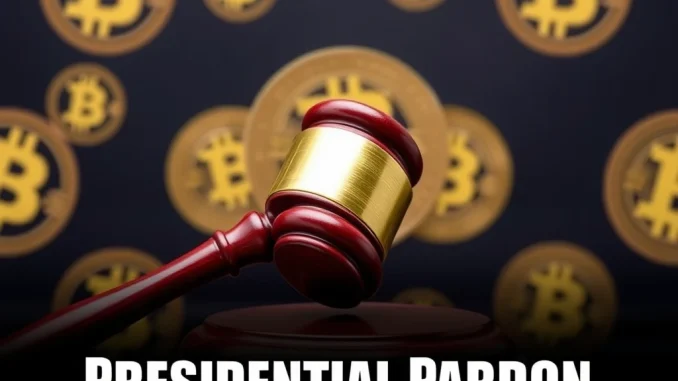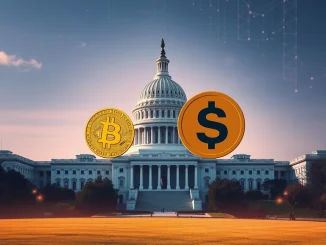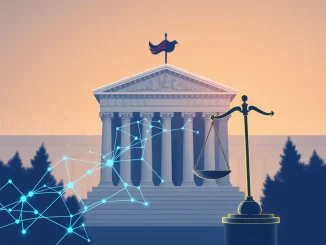
In a stunning move that has sent ripples through the cryptocurrency world, former U.S. President Donald Trump has issued pardons to BitMEX’s co-founders Arthur Hayes, Benjamin Delo, and Samuel Reed. This dramatic intervention comes after the trio pleaded guilty to violating the Bank Secrecy Act (BSA) and agreed to hefty $10 million penalties each in 2022. Let’s dive into the details of this Trump pardon and explore what it means for the future of crypto regulation and the individuals involved.
Why the Trump Pardon for BitMEX Founders is a Big Deal
This isn’t just another headline; it’s a significant event with far-reaching implications. The pardon essentially wipes the slate clean for Hayes, Delo, and Reed in the eyes of the law regarding these specific charges. But why is this pardon so noteworthy?
- High-Profile Case: The BitMEX case was a landmark one, highlighting the U.S. government’s increasing scrutiny of cryptocurrency exchanges and their adherence to Anti-Money Laundering (AML) regulations.
- Significant Penalties: Beyond the individual $10 million fines, BitMEX had already paid a staggering $100 million fine for failing to implement adequate AML safeguards. This shows the severity of the alleged violations.
- Presidential Intervention: Presidential pardons, especially in cases related to financial regulations within the burgeoning crypto space, are rare and carry substantial weight.
To truly understand the gravity, let’s recap the core issue: AML violations.
Understanding AML Violations and the Bank Secrecy Act
The Bank Secrecy Act (BSA) is a cornerstone of U.S. efforts to combat money laundering and financial crimes. It mandates financial institutions to implement measures that prevent their platforms from being used for illicit activities. For cryptocurrency exchanges like BitMEX, this means:
- Know Your Customer (KYC) Procedures: Verifying the identity of their users to prevent anonymous transactions that could facilitate money laundering.
- Suspicious Activity Reporting (SAR): Monitoring transactions and reporting any activity that seems suspicious or potentially linked to illegal activities.
- Compliance Programs: Establishing robust internal programs to ensure ongoing adherence to AML regulations.
BitMEX, once a dominant force in the crypto derivatives market, was accused of failing to implement these crucial safeguards adequately. The Trump pardon doesn’t negate the fact that these allegations were made and investigated, but it does remove the legal repercussions for the co-founders.
What Does This Mean for Cryptocurrency Regulation?
The timing of this pardon, just as the crypto industry is facing increasing regulatory pressure globally, is particularly interesting. Does this signal a potential shift in the U.S. approach to cryptocurrency regulation, or is it an isolated act of presidential clemency?
Here are a few perspectives to consider:
| Perspective | Implication |
|---|---|
| Reduced Regulatory Stringency? | Some might interpret this pardon as a sign that the U.S. might be softening its stance on crypto regulation, potentially encouraging innovation and growth in the sector. |
| Political Motivations? | Others may see it as a politically motivated decision, perhaps unrelated to broader regulatory policy, given Trump’s past stances on various financial matters. |
| Case-Specific Clemency? | It’s also possible that this pardon is simply a case of presidential clemency based on specific circumstances of the case, without signaling any major regulatory shift. |
Regardless of the underlying motivations, the Trump pardon undoubtedly adds another layer of complexity to the ongoing debate around crypto regulation. It could embolden some in the industry who feel regulations are overly burdensome, while simultaneously raising concerns among regulators who are striving for greater oversight.
The Future for BitMEX Co-founders and the Exchange
For Arthur Hayes, Benjamin Delo, and Samuel Reed, this pardon offers a clean slate. They can now move forward without the shadow of these criminal charges hanging over them. What could this mean for them and BitMEX?
- Return to Crypto? With the legal hurdles removed, it’s conceivable that the co-founders could become more actively involved in the crypto space again, potentially even with BitMEX or new ventures.
- Reputational Impact: While the pardon clears their legal names, the reputational impact of the AML violations and guilty pleas may linger, affecting future endeavors.
- BitMEX’s Trajectory: BitMEX has been working to rebuild its reputation and compliance framework. This pardon, while benefiting the individuals, might have a mixed impact on the exchange’s ongoing efforts to regain market share and trust.
Key Takeaways: Trump Pardon and Crypto
Let’s summarize the key takeaways from this surprising development:
- Presidential Power in Crypto: The pardon highlights the significant, albeit potentially unpredictable, influence that political decisions can have on the cryptocurrency industry.
- AML Compliance Remains Crucial: Despite the pardon, the importance of robust AML compliance for crypto exchanges remains undiminished. Regulatory scrutiny in this area is likely to intensify, not lessen.
- Uncertain Regulatory Path: The long-term implications of this pardon for the broader landscape of cryptocurrency regulation are still uncertain and will likely unfold in the coming months and years.
In conclusion, the Trump pardon of the BitMEX co-founders is a dramatic event that injects further intrigue into the ever-evolving narrative of cryptocurrency and its relationship with global regulatory bodies. It serves as a powerful reminder of the intersection of law, politics, and the rapidly transforming world of digital assets. The crypto community will be watching closely to see how this unprecedented move shapes the future of the industry.



